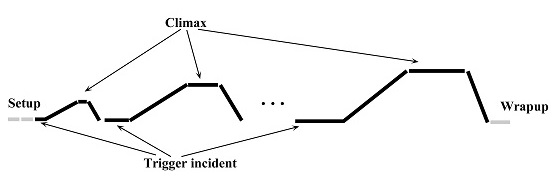This is interesting... because I've always looked at arcs a bit differently than is described here. I'm not arguing the point, but just saying that I've probably used them incorrectly.
If I understand what's being said, and an arc is the sum of the changes a character goes through, then I imagine that if we were to plot this arc on graph paper it would show up as a straight line. Character starts journey at coordinate 0,5, and finishes at 10,8 - and we're done.
The way I've looked at arcs are as the map of changes made over time. Character starts journey at coordinate 0,5, then moves: 1,4; 2,2; 3,1; 4,1; 5,2; 6,3; 7,5; 8,6, 9,7, and finally 10,8. So, for me it's more of a map of the conflict and / or mental state of the character over time.
Just my take on it - and I said, I'm probably wrong.





